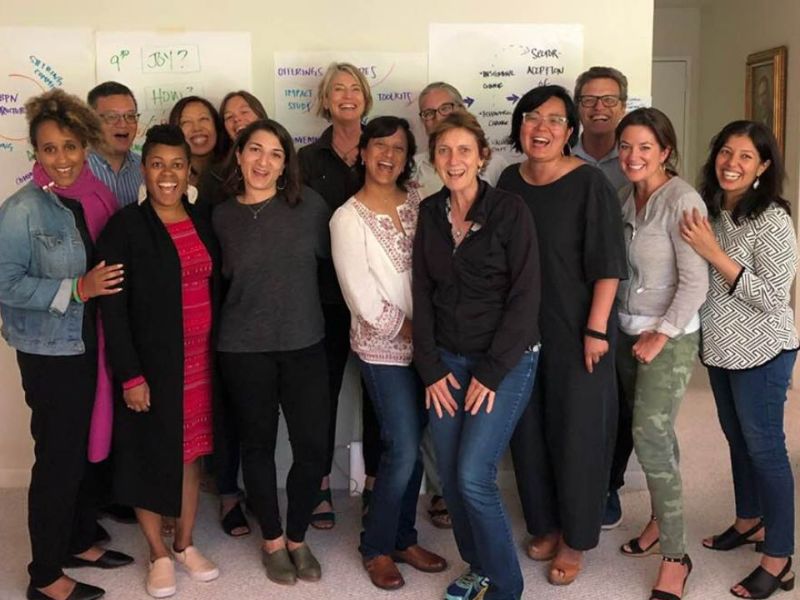Launch of the Trust-Based Philanthropy Project

On January 22, the Headwaters Foundation, Robert Sterling Clark Foundation, and The Whitman Institute announced the launch of the Trust-Based Philanthropy Project, a five-year, peer-to-peer funder initiative with the goal of bringing greater vulnerability, transparency, and humility to philanthropy.
Philanthropy is experiencing a cultural moment of power-reckoning, with more and more foundations coming to terms with the entrenched imbalances they’ve inherited, created, or inadvertently helped sustain. Left unchecked, these power dynamics get exacerbated by policies and practices that require nonprofits to jump through hoops to prove their worth, year after year. The Trust-Based Philanthropy Project builds upon existing efforts to bring more equity and accountability to philanthropy, offering concrete steps for funders to build radically different grantee relationships through trust-based practices and behaviors.
Over the next five years, the Project aims to make trust-based philanthropy the norm rather than the exception. Key to this shift will be collaborations with regional associations and other philanthropic-serving organizations that will help seed and build regional learning communities around trust-based philanthropy. Thus far, the Project has cultivated an informal network of more than a dozen foundations that have signed on to publicly share their experiences with the approach and aid others in adopting trust-based practices.
The Project’s Steering Committee—helmed by leaders from Durfee Foundation, Headwaters Foundation, Robert Sterling Clark Foundation, Thousand Currents, and The Whitman Institute—will guide the overall strategy of the Project, with the leadership of a Project Director and ongoing input from grantee partners and foundation colleagues. And thanks to multi-year commitments from the Whitman Institute, Satterberg Foundation, Robert Sterling Clark Foundation, Headwaters Foundation, Durfee Foundation, and General Service Foundation, the Project has raised enough money to sustain for the full five-year term.
Pia Infante is co-executive director of The Whitman Institute, a San Francisco-based grantmaking organization that named the approach based on feedback from grantee partners in 2014, and has been advocating for its adoption ever since.
“Philanthropy is operating in a wider social context where economic and environmental inequities are rapidly accelerating—with poor, indigenous, migrant, trans, and black communities bearing the brunt. Do we have the courage and humility to see how philanthropy might be perpetuating these problems even as we fund to alleviate them? Instead of clinging to what we can control, we can meet this overwhelmingly complex moment with curiosity, openness, and a willingness to adapt.” - Pia Infante
Philip Li was a nonprofit executive director before becoming president of New York-based Robert Sterling Clark Foundation. He’d been on the receiving end of non-trusting funder relationships, so he knew when it came to supporting grantees to create a vibrant New York City, he didn’t want to repeat the same funder behaviors he’d experienced.
“Nonprofits, foundations, and communities are all part of the same ecosystem, and we all have roles to play. As funders, we often step into that power without asking ourselves—how can we support our visionary nonprofit and community partners while centering their experiences, wisdom, and leadership?” – Philip Li
Because this approach recognizes relationships and power, it can be complex and messy. But within the Trust-Based Philanthropy Project’s community of grantmakers, there’s a strong value placed on openly sharing stories, missteps, and lessons. Collaborative learning is baked into this approach, with interested funders being paired with experienced practitioners. The Project’s speakers bureau includes leaders from different types of foundations who travel to speak about trust-based philanthropy at foundation board meetings, regional associations, or industry keynotes. While trust-based philanthropy offers multiple entry points, from streamlining grantee paperwork to implementing multi-year unrestricted funding, there is a common thread: ultimately, it won’t be successful if there isn’t also a willingness to assess, address, and redirect power.
Brenda Solorzano moved to Montana in 2018 to start the Headwaters Foundation, after 18 years of philanthropic work in California. Creating a new organization meant the chance to build things from the ground-up. While Brenda recognizes her unique situation, she’s confident that more established foundations can also embrace trust-based principles as a way of putting their values into practice.
“Trust-based philanthropy invites us to think more expansively about our role as grantmakers. What if we looked at our work through the lens of partnership and service, rather than gatekeeping and transaction? What if we were to recognize the great privilege and honor of leveraging our resources to make it as easy as possible for nonprofits to focus on their mission-critical work? And what if learning was more central to our work than enforcement?” – Brenda Solorzano
Trust-Based Philanthropy Project
The Trust-Based Philanthropy Project is a peer-to-peer learning and advocacy initiative to make trust-based practices the norm in philanthropy. Recognizing the inherent power imbalance between foundations and nonprofits, we believe philanthropy will be more successful, rewarding, and effective if funders approach their grantee relationships from a place of trust, humility, and transparency. (Website)
The Whitman Institute
The Whitman Institute advances social, political, and economic equity by funding dialogue, relationship building, and inclusive leadership. Founded in 1985, The Whitman Institute’s trust-based approach to philanthropy is informed by a decade of experience that relationships are stronger and more effective when they are built on a foundation of trust. (Website)
Robert Sterling Clark Foundation
The Robert Sterling Clark Foundation is a private foundation committed to helping create a vibrant New York City – one that is strong, healthy, livable and just. With a history of grantmaking in New York City since 1952, the Foundation today invests in leaders, the organizations that develop them, and the networks of which they are a part–all with a trust-based approach. (Website)
Headwaters Foundation
Headwaters Foundation was born from community. A community invested in western Montana. With more than $100 million in assets, Headwaters works side-by-side with Western Montanans to improve the health of our communities. Our vision is a western Montana where all people, especially the most vulnerable among us, are healthy and thriving. (Website)
